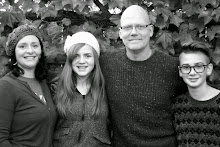Over many years, and at various levels, I have considered God's creation and our relationship to it as Christ-follo

wers. I've always loved being in nature whether it be in the mountains of Central California, the beaches of Southern California, the forests of Russia or the bushveld of South Africa. However, in my early
days as a Christian, I began to think that God's creation was given to man to rule over, and, therefore, we could do with it as we please. I don't know if I would have said this directly or not, but I kind of felt like it was all going to H, E, double toothpicks in any case, so let's us it as it seems fit for man. Perhaps this came out of a fear of deifying nature, or perhaps it came from the way I used to view the end times and the future of the earth.
In more recent years, I've wondered why the Church is rarely on the frontlines in the battle to conserve God's creation. And not just to conserve nature, but to use its resources for the common good of all men. Unfortunately, I see much of the exploitation of God's creation predominately benefiting the rich of the world. This has been easier to see during my years in Russia and South Africa, but I know this is certainly the case in most, if not all, of our world.
So, how do we relate to God's creation as His children? NieuCommunities South Africa recently hosted a two-day workshop to discuss just that. Our guest speaker was the director of A Rocha South Africa, Alan Goddard. A Rocha (The Rock) is an international organization of Christians in conservation. The workshop was not only very helpful in working through a more holistic theology of creation, but it was also very motivating at a personal and practical level.
A big takeaway for me was the idea that care for God's creation truly begins at home when we decide to live differently in a way that is more in balance with God's creation. And we don't take care of God's creation just for ecology alone, but rather in order to care for humanity (ie. caring for the poor). This can happen as we begin to re-imagine “the good life.” Is it the American dream or is it the dream of our God as He created the earth and all that is in it?
John Stott wrote, “We human beings find our humanness no only in relation to the earth, which we are to transform, but in relation to God, whom we are to worship; not only in relation to the creation, but especially in relation to the Creator. God intends our work to be an expression of our worship, and our care of the creation to reflect our love for the Creator. Only then, whatever we do, in word or deed, shall we be able to do it to the glory of God (I Corinthians 10:31).”
May it be so.
For more information:
http://www.climatestewards.net/why/index.php
 n, although I have only read the first of these two books (however, I would highly recommend both). During the evening Annemie said, "We try to live simply so others can simply live." This is not a new thought to me, but I was struck by the power of this simple statement.
n, although I have only read the first of these two books (however, I would highly recommend both). During the evening Annemie said, "We try to live simply so others can simply live." This is not a new thought to me, but I was struck by the power of this simple statement. 
